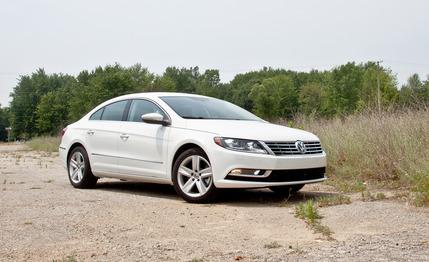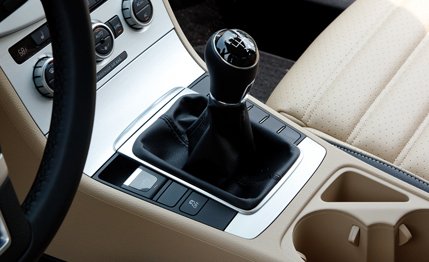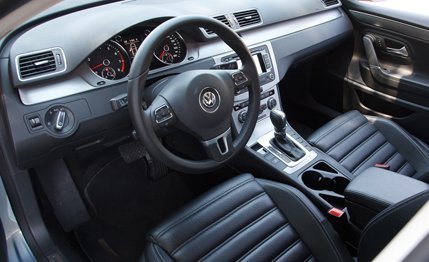 Instrumented Test
Instrumented Test

Save the Manuals! Does that sound familiar? If you’re a Car and Driver regular, you’ve been seeing that plea on our pages, print or electronic, for almost two years. Or perhaps this is your first exposure to our mantra. Or the first time it has really registered with you. Either way, we’re going to elaborate, using a pair of 2013 Volkswagen CCs as teaching aids.
VW vs. VW
To illustrate the distinctions of three pedals and DIY gear selection, we rounded up two versions of the slick CC sedan: one with the standard six-speed manual, one with a six-speed DSG dual-clutch automatic, both with VW’s ubiquitous 2.0-liter four-cylinder turbo.
Both cars were 2013 models. Revisions for the model year are modest and include freshened front and rear styling reminiscent of the Passat’s, the first sheetmetal updates since the CC’s introduction for 2009. This year also brings standard bixenon headlights, LED taillamps, new exterior colors and wheels, and rear seating redesigned to accommodate three passengers rather than two, although vehicle dimensions are unchanged.

Our manual test car, a base Sport model, was devoid of optional equipment. This is the least expensive CC in the lineup, at $31,430. It included, among other standard features, a premium audio system with a six-CD changer and touch-screen controls, a media interface with an iPod cable, cruise control, leatherette seats with power adjustment up front, a rear-seat pass-through, and a trip computer.
The CC automatic, a Lux version, had the Sport’s features, plus a set of 18-inch aluminum wheels, dark brushed-aluminum interior trim, ambient lighting, and a power tilting-and-sliding glass sunroof. Its sticker was $36,175.
Power Options
The powertrain choices are the same as in previous CCs. The manual and DSG automatic transmissions are offered only with the turbo four, which delivers 200 hp and 207 lb-ft of torque in this application. The upgrade engine is VW’s 3.6-liter VR6—280 hp, 265 lb-ft—mated with a six-speed torque-converter automatic. Pricing for VR6 models starts at $38,550 for a Lux and includes more standard goodies (upgraded nav, a rearview camera, leather). Add $3690 if you want VW’s 4MOTION all-wheel-drive system, plus Tiptronic paddle shifters, parking sensors, an upgraded audio system, front-seat ventilation, and a power rear sunshade.

That’s the new-for-’13 report. Now, back to shifting.
Tangibles
We put both cars through their paces at the test track, and the results were essentially identical. Both cars did the 0-to-60-mph sprint in 6.5 seconds. The manual CC got to 100 mph a little quicker—16.6 seconds versus 17.2—but the automatic’s 15.0-second quarter-mile time was better by 0.2 second. On the other hand, the manual was traveling a little faster at 440 yards, trapping at 95 mph versus 94. It continued to draw away from the automatic as speeds climbed, taking 20.9 seconds to reach 110 mph versus 21.8, 26.3 for 120 versus 28.5.